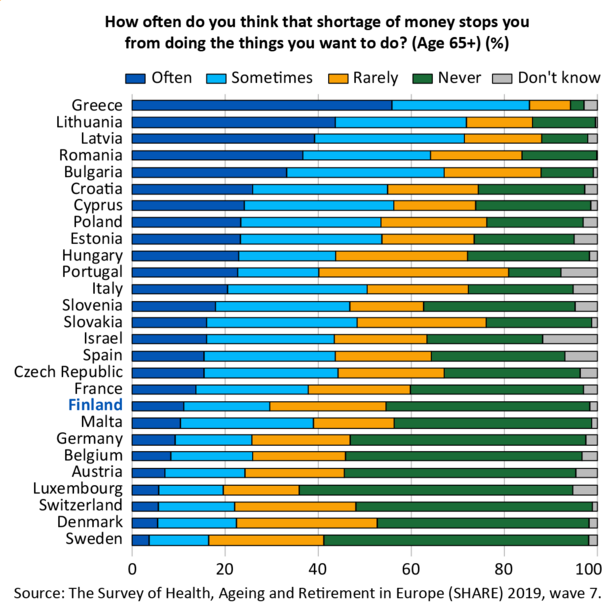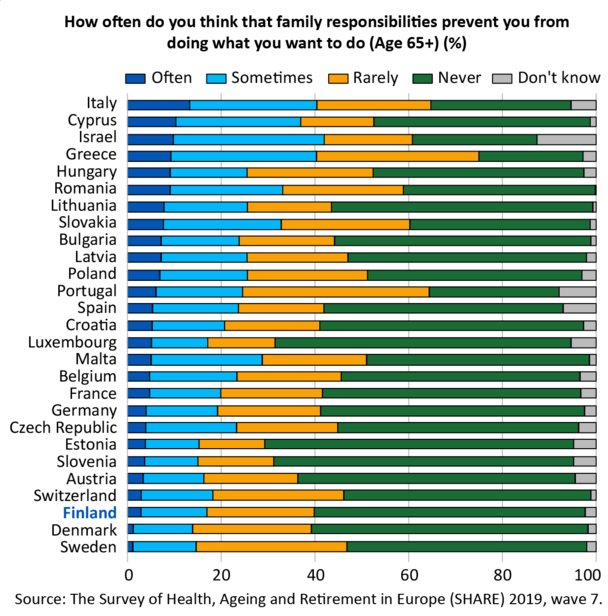How does the quality of life of older Finnish citizens compare to that of older citizens in Europe?
Older people in Finland are forced to give up on things they want to do because of shortage of money and family responsibilities slightly more often than their Swedish and Danish counterparts. Nevertheless, such problems are considerably less common in the Nordic countries than in Eastern and Southern European countries. Things are left undone more often due to shortage of money than family responsibilities.
In 2017, Finland participated for the first time in a SHARE survey (Survey of Health, Ageing and Retirement in Europe). This has made it considerably easier to compare the wellbeing of older people in Finland and the rest of Europe. In this blog I will paint a general picture of the life quality of older people by looking at how often they are prevented from doing what they would like to do because of shortage of money and family responsibilities. The picture describes life before the corona epidemic.
Shortage of money speaks not only of a low income (often in the form of a low pension) but also of high expenses relating to health services and living. Family responsibilities, on the other hand, have to do with house chores, caring for grandchildren, the spouse and other relatives, or with other activities that affect retirees’ doings and use of time.
Money more often a problem in Finland than in other Nordic countries
When we look at how a lack of money restricts older people from doing things they would like to do, we notice that, on average, every fifth European person aged 65 or older has often had to make sacrifices of this kind (Figure 1). Overall, the European countries differ greatly. In Greece and Eastern Europe, this problem is more common than in the rest of Europe. In countries with a higher standard of living, such as the Nordic and Central European countries, the shortage of money affects life less often.
However, it is worth noting that older people struggle more with this issue in Finland than in Sweden and Denmark. In Finland, every tenth retiree has often been forced to leave things undone because of a shortage of money. From a previous study we know that, in Finland, the low-income, less healthy, single retirees are more often forced to give up on, for example, hobbies or travels than others because they cannot afford them. They also struggle with making ends meet with regards to necessities.

Problems due to family responsibilities less common
On average, less than one in ten older people have had to give up things they would like to do because of family responsibilities (Figure 2). The differences in groups of countries in this matter are approximately the same as for income. On the other hand, instead of in Eastern European countries, the problem is more common in Italy and other countries in Southern Europe. For example, children are known to live longer with their parents in Italy. In Finland, the problems are more common than in the other Nordic countries, but minor compared to other European countries.

An exploration of SHARE-data shows that problems related to livelihood more often weaken the quality of life of people in poor health, of people living in other than two-person households, of women and, to some degree, of younger people. Family responsibilities often apply to people who live in more-than-one-person households, alarmingly also to those in poorer health and to women.
In the future we should find out to which extent the shortcomings in the quality of life that are due to problems relating to livelihood are linked more broadly to pensions and social and health service systems, but also to the cost of living (e.g., living and food expenses). The reasons may be the same in different countries, but there may also be differences in, for example, pension levels or prices and the availability of health services. It is also good to notice that income and family responsibilities are not the only reasons for leaving things undone. Challenges with one’s own health and social relations may also weaken the life quality of the elderly.
The associations captured above naturally picture the differences in wellbeing before the major challenges to people’s wellbeing caused by the Corona epidemic in early 2020. How life turns out after the crisis and in the long rung is unknown at this point. Nevertheless, should the data collection also survive the crisis, the longitudinal nature of the SHARE survey allows us to track down effects that take place in most areas of life.
The SHARE survey will be repeated in Finland in the 8th wave, but after that, the future of the survey is unknown. In Finland, the survey is conducted by the Family Federation of Finland.
